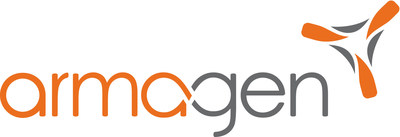ArmaGen Technologies, Inc. Announces First Patient Dosed In Phase 1/2a Clinical Trial Of AGT-181 For The Treatment Of Hurler Syndrome
CALABASAS, Calif., Sept. 2, 2015 /PRNewswire/ -- ArmaGen, Inc., a privately held biotechnology company focused on developing revolutionary therapies to treat severe neurological disorders, announced today that the first patient has been dosed in its multi-center Phase 1/2a clinical trial of AGT-181 in patients with attenuated mucopolysaccharidosis type I (MPS I).

AGT-181 is an investigational enzyme replacement therapy (ERT) for the treatment of MPS I. The most severe form of MPS I, Hurler syndrome, is a rare, hereditary lysosomal storage disorder that affects the brain and spinal cord in children, resulting in a wide range of debilitating symptoms.
"Dosing the first patient in the AGT-181 study represents another important step toward our goal of providing patients and physicians with treatment options for the currently unaddressed complications of Hurler syndrome," said James Callaway, Ph.D., Chief Executive Officer of ArmaGen. "AGT-181 is our second investigational product to enter the clinic this year and represents ArmaGen's continued commitment to addressing rare pediatric diseases."
The primary objective of the Phase 1/2a trial is to test the safety and determine a well-tolerated dose of AGT-181 in adult patients with Hurler-Scheie and Scheie, which are attenuated or less severe forms of MPS I. ArmaGen plans to enroll nine patients 18 years and older into the study. These patients will be treated for a total of eight weeks, with all enrolled patients receiving AGT-181. Further details on the trial can be found at http://www.breakingbarriersmpsitrial.com or https://clinicaltrials.gov using the identifier number NCT02371226. Pending the results of the Phase 1/2a trial, ArmaGen plans to conduct subsequent studies in a pediatric population of patients with MPS I, including those with Hurler syndrome.
Commercially available treatments for Hurler syndrome do not penetrate the blood-brain barrier (BBB), and therefore do not address the severe and progressive neurological complications of the disease. AGT-181 is designed to utilize the body's natural system for transporting products non-invasively across the BBB and into the central nervous system by targeting the receptor that delivers insulin to all cells of the body.
About Hurler Syndrome
Hurler syndrome is a rare, hereditary, lysosomal storage disease that arises from a deficiency or absence of the enzyme iduronidase (IDUA), which is needed to break down complex sugars produced by the body. Hurler syndrome affects the brain and spinal cord in children, resulting in debilitating signs and symptoms that include developmental delay, progressive mental decline, loss of physical function, impaired language development (due to hearing loss and an enlarged tongue), corneal and retinal damage, carpal tunnel syndrome, and restricted joint movement. Hurler syndrome affects approximately 3,000 patients worldwide, with approximately 6.7 percent in the U.S.1
Hurler syndrome is also known as mucopolysaccharidosis I or MPS I. Attenuated or less severe forms of MPS I include Hurler-Scheie and Scheie syndromes. Patients with Hurler-Scheie syndrome may suffer from mild cognitive impairment or problems with attention. Patients with Scheie syndrome generally have a later onset and milder symptoms with a slower disease progression, although they can develop significant systemic morbidity.
About AGT-181
AGT181 is a novel, investigational enzyme replacement therapy (ERT) for the treatment of neurological complications in patients with Hurler syndrome. Using ArmaGen's proprietary technology, AGT-181 takes advantage of the body's natural system for transporting products across the blood-brain barrier (BBB) by targeting the same receptor that delivers insulin to the brain. ArmaGen developed AGT-181 by re-engineering an enzyme called iduronidase (IDUA) as an immunoglobulin G (IgG) fusion protein. The fusion protein binds to insulin receptors located on the surface of the BBB, enabling its passage into the brain.
About ArmaGen
ArmaGen, Inc. is a privately held biotechnology company focused on developing revolutionary therapies for severe neurological disorders. The company is developing a robust pipeline of innovative therapies for the treatment of neurological complications of lysosomal storage disorders such as Hunter syndrome, Hurler syndrome, metachromatic leukodystrophy and Sanfilippo A syndrome, as well as central nervous system diseases such as Alzheimer's and Parkinson's. ArmaGen's pipeline is based on decades of scientific leadership in engineering therapies to cross the BBB and a dominant intellectual property portfolio. The company is advancing its pipeline through licensing and collaboration agreements, in-house development programs, and future partnering opportunities. For more information, visit www.armagen.com.
Contacts:
ArmaGen, Inc.
Derek Kelaita
Vice President, Business Development
818-252-8200
dkelaita@armagen.com
For media inquiries:
Lauren Wilson
SmithSolve LLC
973-442-1555 ext. 115
lauren.wilson@smithsolve.com
1 Mucopolysaccharidoses Fact Sheet. National Institute of Neurological Disorders and Stroke. NINDS, April 16, 2014. http://www.ninds.nih.gov/disorders/mucopolysaccharidoses/detail_mucopolysaccharidoses.htm
Logo - http://photos.prnewswire.com/prnh/20141201/161625LOGO
To view the original version on PR Newswire, visit:http://www.prnewswire.com/news-releases/armagen-announces-first-patient-dosed-in-phase-12a-clinical-trial-of-agt-181-for-the-treatment-of-hurler-syndrome-300136944.html
SOURCE ArmaGen, Inc.
 Help employers find you! Check out all the jobs and post your resume.
Help employers find you! Check out all the jobs and post your resume.
